Unit 6 If you go to the party,you’ll have a great time! 单元复习课件(共28张PPT)
文档属性
| 名称 | Unit 6 If you go to the party,you’ll have a great time! 单元复习课件(共28张PPT) | 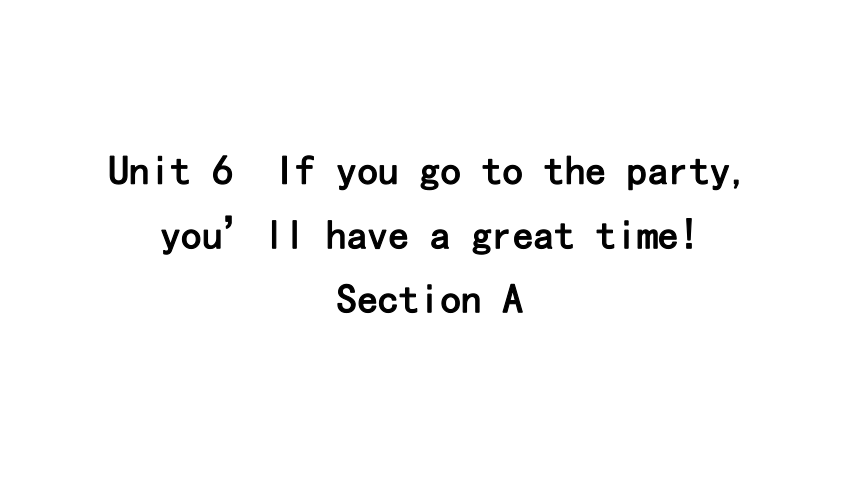 | |
| 格式 | pptx | ||
| 文件大小 | 160.0KB | ||
| 资源类型 | 教案 | ||
| 版本资源 | 鲁教版 | ||
| 科目 | 英语 | ||
| 更新时间 | 2024-07-06 08:28:24 | ||
图片预览

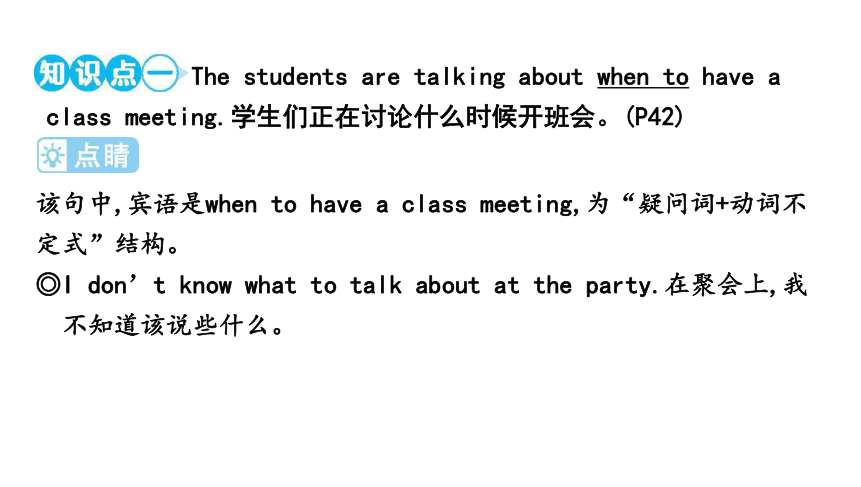
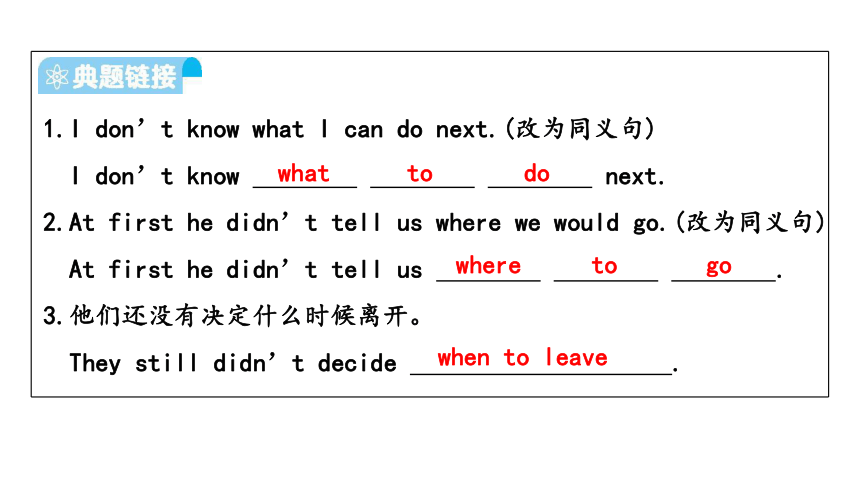
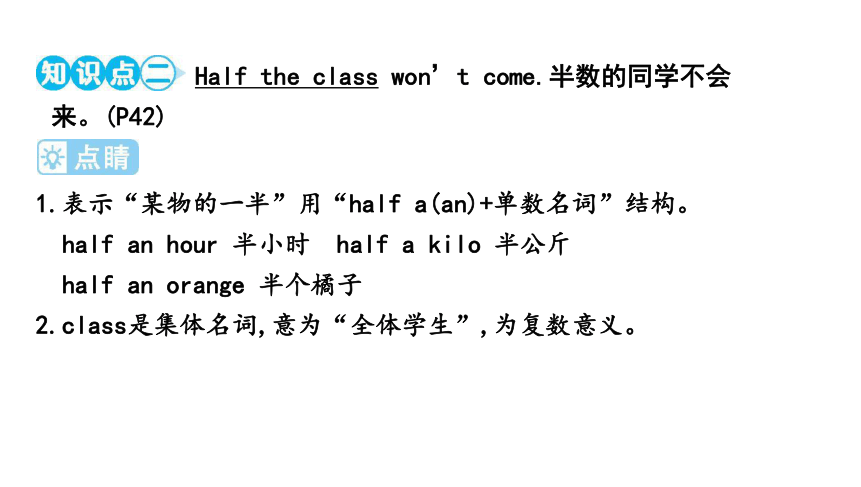
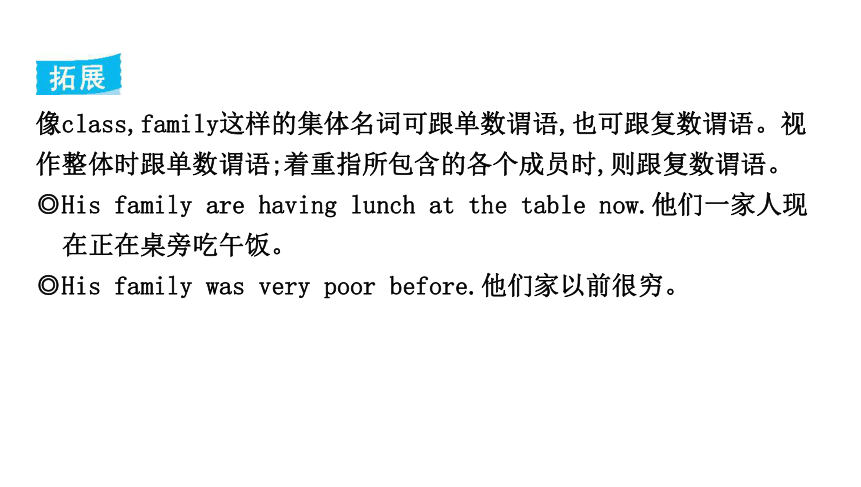
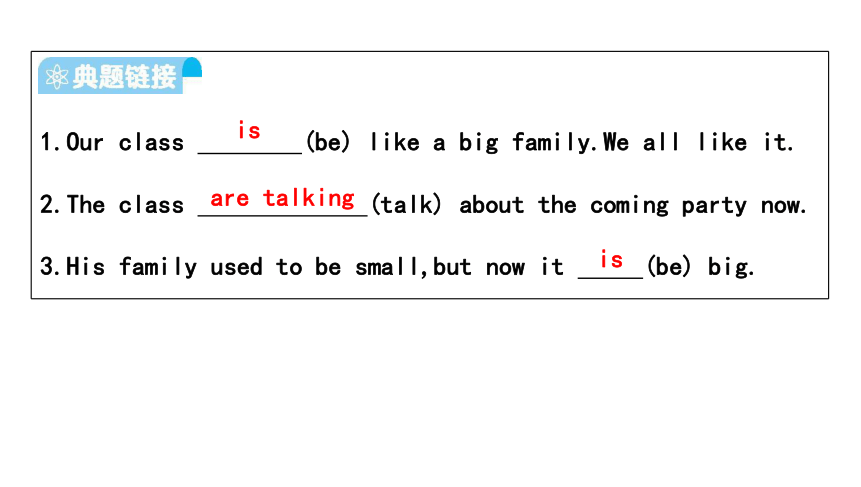
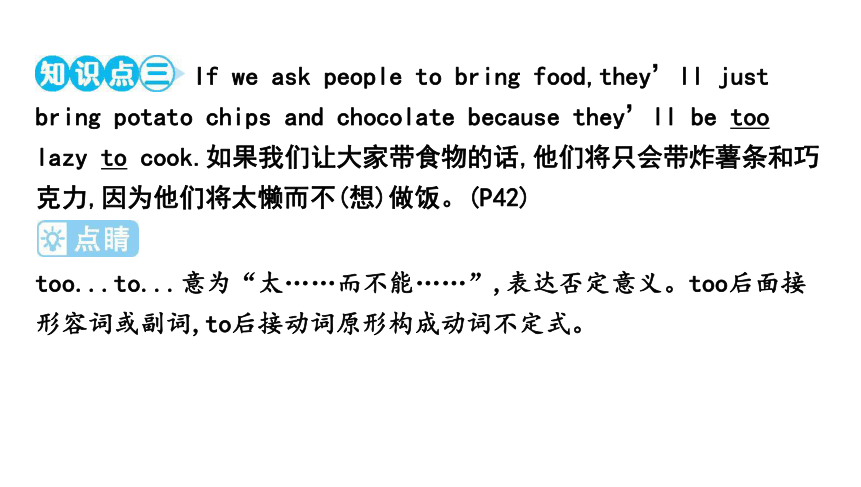
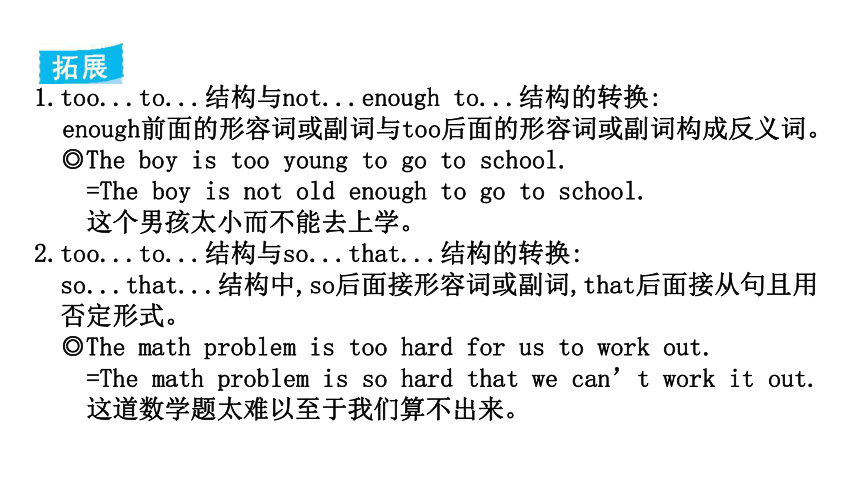
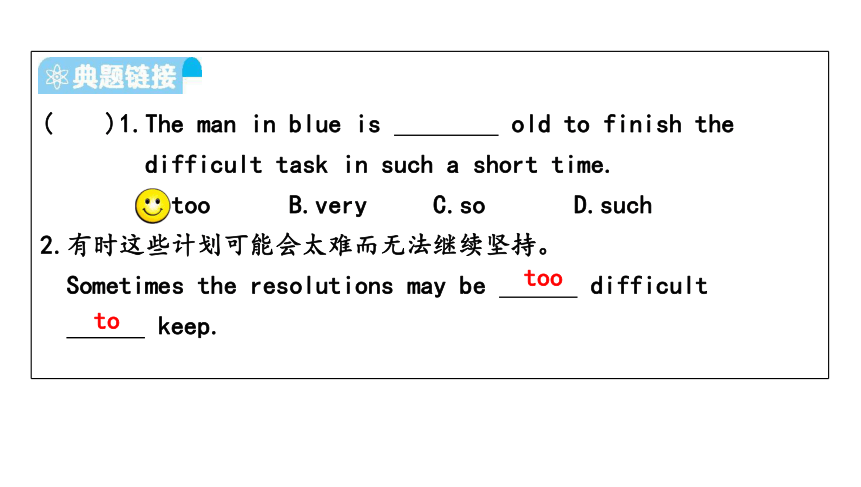
文档简介
(共28张PPT)
Unit 6 If you go to the party,
you’ll have a great time!
Section A
The students are talking about when to have a class meeting.学生们正在讨论什么时候开班会。(P42)
该句中,宾语是when to have a class meeting,为“疑问词+动词不定式”结构。
◎I don’t know what to talk about at the party.在聚会上,我
不知道该说些什么。
1.I don’t know what I can do next.(改为同义句)
I don’t know next.
2.At first he didn’t tell us where we would go.(改为同义句)
At first he didn’t tell us .
3.他们还没有决定什么时候离开。
They still didn’t decide .
what
to
do
where
to
go
when to leave
Half the class won’t come.半数的同学不会来。(P42)
1.表示“某物的一半”用“half a(an)+单数名词”结构。
half an hour 半小时 half a kilo 半公斤
half an orange 半个橘子
2.class是集体名词,意为“全体学生”,为复数意义。
像class,family这样的集体名词可跟单数谓语,也可跟复数谓语。视作整体时跟单数谓语;着重指所包含的各个成员时,则跟复数谓语。
◎His family are having lunch at the table now.他们一家人现
在正在桌旁吃午饭。
◎His family was very poor before.他们家以前很穷。
1.Our class (be) like a big family.We all like it.
2.The class (talk) about the coming party now.
3.His family used to be small,but now it (be) big.
is
are talking
is
If we ask people to bring food,they’ll just bring potato chips and chocolate because they’ll be too lazy to cook.如果我们让大家带食物的话,他们将只会带炸薯条和巧克力,因为他们将太懒而不(想)做饭。(P42)
too...to...意为“太……而不能……”,表达否定意义。too后面接形容词或副词,to后接动词原形构成动词不定式。
1.too...to...结构与not...enough to...结构的转换:
enough前面的形容词或副词与too后面的形容词或副词构成反义词。
◎The boy is too young to go to school.
=The boy is not old enough to go to school.
这个男孩太小而不能去上学。
2.too...to...结构与so...that...结构的转换:
so...that...结构中,so后面接形容词或副词,that后面接从句且用
否定形式。
◎The math problem is too hard for us to work out.
=The math problem is so hard that we can’t work it out.
这道数学题太难以至于我们算不出来。
( )1.The man in blue is old to finish the
difficult task in such a short time.
A.too B.very C.so D.such
2.有时这些计划可能会太难而无法继续坚持。
Sometimes the resolutions may be difficult
keep.
too
to
3.他太小了,不能独自去那儿。
.
.
.
He is too young to go there alone.∕He’s so young
that he can’t go there alone./He is not old enough to
go there alone.
Can you give me some advice please 请问你能给我一些建议吗 (P43)
advice 意为“劝告,忠告,建议”,为不可数名词,若要表示数量,需借助单位词piece。two pieces of advice两条建议。
advise作动词,意为“劝告,建议”。常用短语advise sb.(not) to do sth.意为“劝某人(不)做某事”。
1.关于如何学英语,老师给我提了三条建议。
The teacher gave me on how
to learn English.
2.我们应该劝他不要在教室里大喊大叫。
We should in the
classroom.
three pieces of advice
advise him not to shout
Section B
Unless we talk to someone,we’ll certainly feel worse.如果我们不和别人说一说自己的烦恼,我们一定会感到更糟糕。(P45)
1.unless意为“除非,如果不”,是从属连词,引导条件状语从句,含有
否定意义,相当于if not。因此本句也可说成:If we don’t talk
to someone,we’ll certainly feel worse.
2.certainly作副词,意为“当然,肯定”。certainly用于be动词、助
动词、情态动词后,行为动词前。
◎I can certainly work out the math problem.我当然能做出这
道数学题。
certainly可单独使用,用在答语中表示“当然可以,没问题”,此时
可以与sure,of course 换用。
◎—Can you help me 你能帮我吗
—Certainly.What’s it 当然可以。什么事
( )1.We won’t believe it we see it with our
own eyes.
A.because B.unless
C.if D.after
( )2.—Do you often help your parents with any housework
at home
— .I have to wash the dishes after dinner
every day.
A.Never B.Maybe
C.Certainly D.Ever
( )3.—Would you mind going to the park with us this
Sunday
— .I haven’t been outdoors these days.I
can’t wait!
A.Sorry,I can’t B.Sure,I’d love to
C.Certainly not D.My pleasure
4.You can’t pass the exam unless you study hard.(改为同义
句)
You can’t pass the exam you .
hard.
if
don’t
study
She even walked three miles to school each day because she didn’t have any money.因为没有钱,她甚至每天步行三英里路去上学。(P45)
mile作为里程计量单位,是可数名词,意为“英里”。
◎I had to drive 20 miles to work every day.我每天不得不行驶
20英里去上班。
表示距离、时间、金钱等度量的复数名词作主语时,一般被看作一个整体,谓语动词用单数。
◎Fifteen miles seems like a long walk to us.十五英里对于我
们来说似乎是一个要走很远的路程。
◎Two years isn’t long enough to build the tall building.要
建成这座高楼,两年的时间不够长。
1.Twenty years (be) a long time.
2.Two miles (seem) a bit far.
3.20 dollars (be) too much for the old coin.
is
seems
is
Her dad said he sometimes made careless mistakes himself.她爸爸说他自己有时候也会犯那些粗心的错误。(P45)
1.make mistakes为固定短语,意为“犯错误”。
◎The best of us can make mistakes.我们中最好的人也会犯错
误。
【注意】强调具体犯的错误时用make a mistake。
◎She made a mistake in the math problem.她在这道数学题中出
了差错。
2.careless意为“粗心的”,对应的反义词是careful,意为“细心
的”。
英语中以-ful和-less互为反义词的后缀形容词还有:
hopeful(有希望的)—hopeless (没有希望的)
useful (有用的)—useless(没用的)
helpful(有帮助的)—helpless(没有帮助的)
1.He is such a (care) boy that he usually makes
mistakes in his homework.
2.A dictionary is really (help) when you study.
3.When you’re learning a new language,you can’t be afraid
to (出错),or you won’t
get progress.
4.If we are careful,we will (少犯错误).
careless
helpful
make mistakes/make a mistake
make fewer mistakes
I will always remember to share my problems in the future!以后我会一直记得把我的问题告诉别人。(P45)
remember to do sth.记着去做某事,表示这件事情还没有做。
◎Remember to turn off the lights when you leave the room.在你
离开房间时,记得把灯关了。
remember doing sth.记得做过某事,表示这件事情已经做了。
◎I remember turning off the lights when I left the room.我记
得当我离开房间的时候我关灯了。
1.我记得在一次晚会上见到她一次。
I her at a party once.
2.今天早晨我忘了带字典。
This morning,I the dictionary with me.
3.你到了之后请记着给我打电话!
Please me when you arrive!
remember meeting
forgot to bring
remember to call
Unit 6 If you go to the party,
you’ll have a great time!
Section A
The students are talking about when to have a class meeting.学生们正在讨论什么时候开班会。(P42)
该句中,宾语是when to have a class meeting,为“疑问词+动词不定式”结构。
◎I don’t know what to talk about at the party.在聚会上,我
不知道该说些什么。
1.I don’t know what I can do next.(改为同义句)
I don’t know next.
2.At first he didn’t tell us where we would go.(改为同义句)
At first he didn’t tell us .
3.他们还没有决定什么时候离开。
They still didn’t decide .
what
to
do
where
to
go
when to leave
Half the class won’t come.半数的同学不会来。(P42)
1.表示“某物的一半”用“half a(an)+单数名词”结构。
half an hour 半小时 half a kilo 半公斤
half an orange 半个橘子
2.class是集体名词,意为“全体学生”,为复数意义。
像class,family这样的集体名词可跟单数谓语,也可跟复数谓语。视作整体时跟单数谓语;着重指所包含的各个成员时,则跟复数谓语。
◎His family are having lunch at the table now.他们一家人现
在正在桌旁吃午饭。
◎His family was very poor before.他们家以前很穷。
1.Our class (be) like a big family.We all like it.
2.The class (talk) about the coming party now.
3.His family used to be small,but now it (be) big.
is
are talking
is
If we ask people to bring food,they’ll just bring potato chips and chocolate because they’ll be too lazy to cook.如果我们让大家带食物的话,他们将只会带炸薯条和巧克力,因为他们将太懒而不(想)做饭。(P42)
too...to...意为“太……而不能……”,表达否定意义。too后面接形容词或副词,to后接动词原形构成动词不定式。
1.too...to...结构与not...enough to...结构的转换:
enough前面的形容词或副词与too后面的形容词或副词构成反义词。
◎The boy is too young to go to school.
=The boy is not old enough to go to school.
这个男孩太小而不能去上学。
2.too...to...结构与so...that...结构的转换:
so...that...结构中,so后面接形容词或副词,that后面接从句且用
否定形式。
◎The math problem is too hard for us to work out.
=The math problem is so hard that we can’t work it out.
这道数学题太难以至于我们算不出来。
( )1.The man in blue is old to finish the
difficult task in such a short time.
A.too B.very C.so D.such
2.有时这些计划可能会太难而无法继续坚持。
Sometimes the resolutions may be difficult
keep.
too
to
3.他太小了,不能独自去那儿。
.
.
.
He is too young to go there alone.∕He’s so young
that he can’t go there alone./He is not old enough to
go there alone.
Can you give me some advice please 请问你能给我一些建议吗 (P43)
advice 意为“劝告,忠告,建议”,为不可数名词,若要表示数量,需借助单位词piece。two pieces of advice两条建议。
advise作动词,意为“劝告,建议”。常用短语advise sb.(not) to do sth.意为“劝某人(不)做某事”。
1.关于如何学英语,老师给我提了三条建议。
The teacher gave me on how
to learn English.
2.我们应该劝他不要在教室里大喊大叫。
We should in the
classroom.
three pieces of advice
advise him not to shout
Section B
Unless we talk to someone,we’ll certainly feel worse.如果我们不和别人说一说自己的烦恼,我们一定会感到更糟糕。(P45)
1.unless意为“除非,如果不”,是从属连词,引导条件状语从句,含有
否定意义,相当于if not。因此本句也可说成:If we don’t talk
to someone,we’ll certainly feel worse.
2.certainly作副词,意为“当然,肯定”。certainly用于be动词、助
动词、情态动词后,行为动词前。
◎I can certainly work out the math problem.我当然能做出这
道数学题。
certainly可单独使用,用在答语中表示“当然可以,没问题”,此时
可以与sure,of course 换用。
◎—Can you help me 你能帮我吗
—Certainly.What’s it 当然可以。什么事
( )1.We won’t believe it we see it with our
own eyes.
A.because B.unless
C.if D.after
( )2.—Do you often help your parents with any housework
at home
— .I have to wash the dishes after dinner
every day.
A.Never B.Maybe
C.Certainly D.Ever
( )3.—Would you mind going to the park with us this
Sunday
— .I haven’t been outdoors these days.I
can’t wait!
A.Sorry,I can’t B.Sure,I’d love to
C.Certainly not D.My pleasure
4.You can’t pass the exam unless you study hard.(改为同义
句)
You can’t pass the exam you .
hard.
if
don’t
study
She even walked three miles to school each day because she didn’t have any money.因为没有钱,她甚至每天步行三英里路去上学。(P45)
mile作为里程计量单位,是可数名词,意为“英里”。
◎I had to drive 20 miles to work every day.我每天不得不行驶
20英里去上班。
表示距离、时间、金钱等度量的复数名词作主语时,一般被看作一个整体,谓语动词用单数。
◎Fifteen miles seems like a long walk to us.十五英里对于我
们来说似乎是一个要走很远的路程。
◎Two years isn’t long enough to build the tall building.要
建成这座高楼,两年的时间不够长。
1.Twenty years (be) a long time.
2.Two miles (seem) a bit far.
3.20 dollars (be) too much for the old coin.
is
seems
is
Her dad said he sometimes made careless mistakes himself.她爸爸说他自己有时候也会犯那些粗心的错误。(P45)
1.make mistakes为固定短语,意为“犯错误”。
◎The best of us can make mistakes.我们中最好的人也会犯错
误。
【注意】强调具体犯的错误时用make a mistake。
◎She made a mistake in the math problem.她在这道数学题中出
了差错。
2.careless意为“粗心的”,对应的反义词是careful,意为“细心
的”。
英语中以-ful和-less互为反义词的后缀形容词还有:
hopeful(有希望的)—hopeless (没有希望的)
useful (有用的)—useless(没用的)
helpful(有帮助的)—helpless(没有帮助的)
1.He is such a (care) boy that he usually makes
mistakes in his homework.
2.A dictionary is really (help) when you study.
3.When you’re learning a new language,you can’t be afraid
to (出错),or you won’t
get progress.
4.If we are careful,we will (少犯错误).
careless
helpful
make mistakes/make a mistake
make fewer mistakes
I will always remember to share my problems in the future!以后我会一直记得把我的问题告诉别人。(P45)
remember to do sth.记着去做某事,表示这件事情还没有做。
◎Remember to turn off the lights when you leave the room.在你
离开房间时,记得把灯关了。
remember doing sth.记得做过某事,表示这件事情已经做了。
◎I remember turning off the lights when I left the room.我记
得当我离开房间的时候我关灯了。
1.我记得在一次晚会上见到她一次。
I her at a party once.
2.今天早晨我忘了带字典。
This morning,I the dictionary with me.
3.你到了之后请记着给我打电话!
Please me when you arrive!
remember meeting
forgot to bring
remember to call
同课章节目录
- Unit 1 Do you want to watch a game show?
- Section A
- Section B
- Unit 2 I'm going to study computer science.
- Section A
- Section B
- Unit 3 Will people have robots?
- Section A
- Section B
- Unit 4 How do you make a banana milk shake?
- Section A
- Section B
- Unit 5 Can you come to my party?
- Section A
- Section B
- Unit 6 If you go to the party, you'll have a great
- Section A
- Section B
- Unit 7 What's the matter?
- Section A
- Section B
- Unit 8 I'll help to clean up the city parks.
- Section A
- Section B
